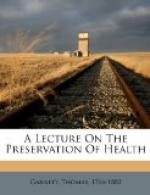A person who has been daily accustomed to much exercise, whether mental or corporeal, if he omit it, will find little or no inclination to sleep; he may however be made to sleep by taking a little diffusible stimulus; for instance, a little warm punch, or opium: these act entirely by exhausting the excitability to that degree which is compatible with sleep; and when their stimulant effect is over, the person soon falls into that state.
But though the excitability may have been sufficiently exhausted, and the action of the external powers considerably moderated, yet there are some things within ourselves, which stimulate violently, and prevent sleep; such as pain, thirst, and strong passions and emotions of the mind. These all tend to drive away sleep, but it may be induced, by withdrawing the mind from these impressions; particularly from uneasy emotions, and employing it on something which makes a less impression; sleep, in such cases, is frequently brought on by listening to the humming of bees, [1] or the murmuring of a rivulet; by employing the mind on subjects which do not require much exertion, nor produce too much commotion; such as counting to a thousand, or counting drops of water which fall slowly.
It sometimes happens, as has been well observed by Dr. Franklin, that an uneasy heat of the skin, from a want of perspiration, occasioned by the heat of the bed-cloaths, will prevent sleep; in this case, he recommends a method, which I believe will often succeed—namely, to get up and walk about the room till you are considerably cooled; when you get into bed again, the heat of the skin will be diminished, and perspiration become more free, and you will probably sleep in a very few minutes. [2]
By induction we have discovered two of the principal laws by which living bodies are governed; the first is, that when the ordinary powers which support life have been suspended, or their action lessened for a time, the excitability, or vital principle accumulates, or becomes more fit to receive their actions; and secondly, when these powers have been acted upon violently, or for a considerable time, the excitability is exhausted, or becomes less fit to receive their actions. There are therefore three states in which living bodies exist.—
First, a state of accumulated excitability.
Second, a state of exhausted excitability.
Third, when it is in such a state as to produce the strongest and most healthy actions, when acted upon by the external powers.
From what I have said, it must appear, that life is a forced state, depending on the action of external powers upon the excitability; and that, by their continued action, if they are properly regulated, the excitability will be gradually and insensibly exhausted; and life will be resigned into the hands of him who gave it, without a struggle, and without a groan.
We see then, that nature operates in supporting the living part of the creation, by laws as simple and beautiful as those by which the inanimate world is governed. In the latter we see the order and harmony which is observed by the planets, and their satellites, in their revolution round the great source of heat and light.




